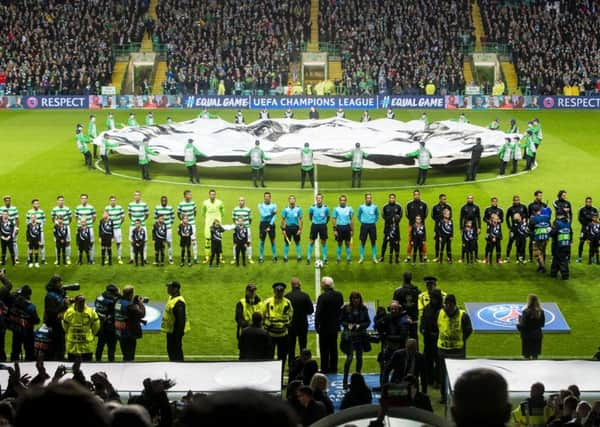Can Celtic realistically compete in the Champions League any more?


Within the last year, Celtic have suffered both their heaviest defeat and their heaviest home loss in their European history. These results wouldn’t be so incongruous if the club were still stuttering along under Ronny Deila, but since Brendan Rodgers’ side first defeated Hapoel Beer-Sheva to return to the group stages of the Champions League after two absent years, there has been nothing but positivity surrounding the club otherwise.
Unfortunately for Celtic, heavy defeats against the elite of Europe may have already become the new norm. Whereas before it was a 3-0 humbling by Juventus or Barcelona, now it’s a five-goal defeat to Paris St Germain in Glasgow. No offence to the Parisians, but they’re not traditionally thought of as one of the elite clubs and it shows the growing gulf in class on the park, aided by the growing gulf in resources off it. It’s a similar situation to the one facing the rest of the clubs in Scotland as they look to end 32 years of Old Firm dominance. Ambition is all very well, but you need the funds to back it up.
Advertisement
Hide AdAdvertisement
Hide AdOn the European stage, Celtic aren’t the only ones to suffer. In 2014/15, there were 15 victories by four or more goals in the Champions League group stages. That was the highest total since the competition expanded to eight groups of four prior to the 99/00 campaign. For five years between 2005/06 and 2009/10, the total of heavy defeats never went above six. Since 2013, it’s never dropped below 11. Last season registered 14. The big guns are dishing out the punishments with greater frequency.
The only outlier since 2010/11, when the numbers started to surge (there was nine that season and the following campaign) was the 2012/13 competition, where Celtic defeated Barcelona and Spartak Moscow (twice) en route to reach the knockout stages, the last time they have ever got to that part of the competition. Did Celtic’s overachievement bring the total number of hammerings down? Or did they benefit from an odd year in European football when the big guns found it tougher to break down their less wealthy opponents? Regardless, can they do it again?
As much as football is weighted toward those whose pockets are bursting at the seams, shocks can still happen. Celtic nearly went undefeated against Barcelona in 2012, and the gap in resources was still quite vast between the two. Was that Celtic team any better than the current incarnation? Possibly, but it’s certainly up for debate. Was PSG’s team on Tuesday night superior to that Barcelona side? This writer wouldn’t say so.
Rodgers may need to take a portion of the blame for these results being the comprehensive hammerings that they are. The Celtic boss has often said, and his actions have backed him up, that he wants his team to go toe-to-toe with any side in Europe. He doesn’t want to change his philosophy on football, he wants to go after them, especially at Celtic Park. Commendable though this may be, you can’t help but wonder if a pragmatic approach, such as those adopted by Neil Lennon or Gordon Strachan, would aid them more on the European stage.
Strachan wasn’t anywhere near as popular as Rodgers among the Celtic support because, as good as the European adventures were, they found it hard to forgive watching his style of football the rest of the team. Like Strachan, Rodgers is unlikely to change his approach due to outside criticism, so fans may have to live with the occasional hammering in Europe if they’re going to enjoy domestic success with a degree of panache.
There is the small matter of the group they’ve been handed. PSG and Bayern Munich are among two of the three favourites to win the entire competition. And while it’s difficult to get tougher than that, it doesn’t look a whole lot easier when you look around. Would Celtic be expected to qualify if they drew Chelsea, Atletico and Roma (Group C), Barcelona and Juventus (Group D) or Real Madrid, Borussia Dortmund and Tottenham (Group H)? Then there’s the qualification campaign to take into account, which is going to get tougher from next year as they have to hurdle over four qualifiers instead of three.
What will help is the £30million they received from last year’s exploits in Europe, and the £30million they’ll receive from this one, not to mention to increased profile from appearing consistently on the Champions League stage. If they continue to improve, continue to get stronger and continue to recruit better players, they will improve in the Champions League. It’ll be a slow process and, with Scottish football still languishing behind in terms of TV revenue, they still won’t get near the likes of PSG, but it’ll help them compete better nonetheless.
All in all, the knockout stages will come again for Celtic, but it’s not as straightforward as some may have imagined going into this season. Celtic got better, but then so did a lot of other sides, especially the heavy hitters. It’ll take time, luck and perhaps a little bit of pragmatism, but they shouldn’t give up hope just yet.
